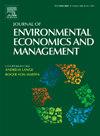人力资本减值还是空气污染折扣?空气质量和求职预期
IF 5.9
3区 经济学
Q1 BUSINESS
Journal of Environmental Economics and Management
Pub Date : 2025-08-21
DOI:10.1016/j.jeem.2025.103223
引用次数: 0
摘要
空气质量通过健康损害和补偿性差异两个主要渠道影响劳动力供给决策。我们扩展的Roy/Borjas模型调和了这两种渠道,表明恶劣的空气质量使高技能求职者望而却步,并通过补偿效应降低了他们的预期工资。利用2016年中国独特的在线简历数据库,我们的研究结果支持了薪酬理论,揭示了高技能求职者更倾向于从污染更严重的城市迁移,在换工作的背景下,显著降低工资预期以换取空气质量的改善。相反,那些打算留在污染地区的人则希望工资上涨能抵消环境的不利影响。这些发现存在于不同的规范、各种稳健性测试和严格的内生性模型中。此外,我们还发现,在风险意识较强、工资议价能力较弱的高技能求职者中,薪酬效应更为明显。本研究通过揭示环境质量对劳动力市场动态的经济后果,为文献做出了贡献。本文章由计算机程序翻译,如有差异,请以英文原文为准。
Human capital impairment or air pollution discount? Air quality and expected job seeking
Air quality affects labor supply decisions through two primary channels of health impairment and compensating differentials. Our extended Roy/Borjas model, which reconciles both channels, demonstrates that poor air quality discourages high-skilled job seekers and reduces their expected wages through compensation effects. Using a unique online resume database from China in 2016, our findings support the compensation theory, revealing that high-skilled job seekers are more inclined to migrate from more polluted cities, significantly lowering wage expectations in exchange for improved air quality in the job-changing context. Conversely, those who intend to remain in polluted areas expect wage premiums to offset environmental disamenities. These findings persist across alternative specifications, various robustness tests, and rigorous endogeneity models. Furthermore, we reveal that the compensation effects are more pronounced among high-skilled job seekers with greater risk awareness and weaker wage-bargaining power. This study contributes to the literature by revealing the economic consequences of environmental quality on labor market dynamics.
求助全文
通过发布文献求助,成功后即可免费获取论文全文。
去求助
来源期刊
CiteScore
8.00
自引率
4.30%
发文量
91
期刊介绍:
The Journal of Environmental Economics and Management publishes theoretical and empirical papers devoted to specific natural resources and environmental issues. For consideration, papers should (1) contain a substantial element embodying the linkage between economic systems and environmental and natural resources systems or (2) be of substantial importance in understanding the management and/or social control of the economy in its relations with the natural environment. Although the general orientation of the journal is toward economics, interdisciplinary papers by researchers in other fields of interest to resource and environmental economists will be welcomed.

 求助内容:
求助内容: 应助结果提醒方式:
应助结果提醒方式:


